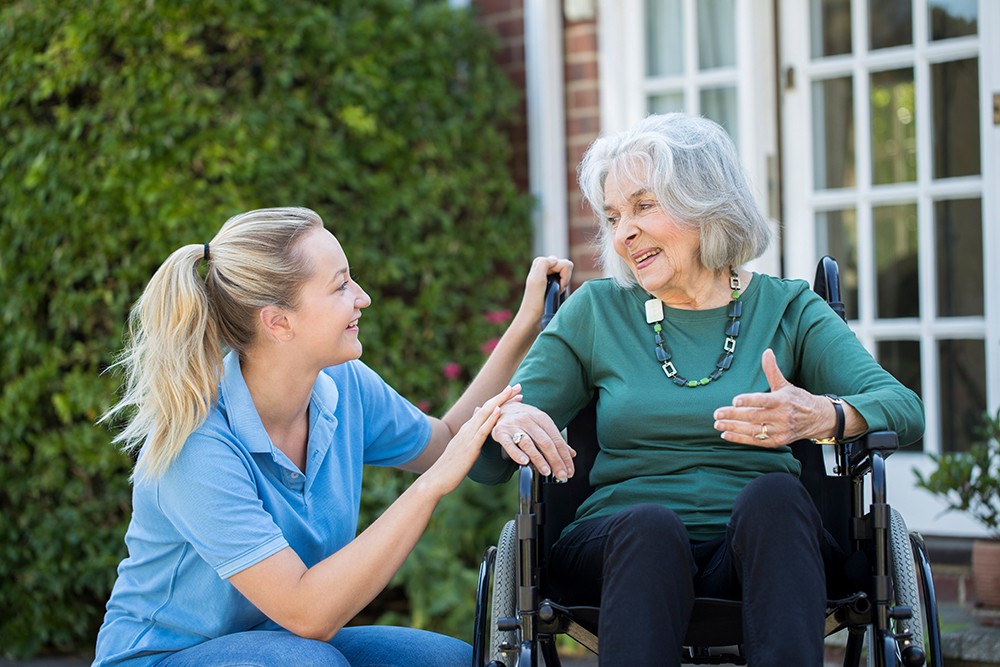As a GP and the owner of a domiciliary care agency in the UK, I’ve witnessed firsthand the profound impact loneliness can have on the elderly. Loneliness is often overlooked as a mere emotional discomfort, but it’s a serious public health issue that significantly affects older adults’ well-being. Social care visits provide a vital lifeline, not just for physical health needs, but also for alleviating the crippling effects of loneliness.
What is Loneliness?
Loneliness, the feeling of disconnection and lack of meaningful relationships is more than just a fleeting pang. It has become a widespread public health concern, with research showing its detrimental impact on both physical and mental well-being. Just like smoking or physical inactivity, chronic loneliness can significantly increase your risk of developing various health problems.
The Grim Reality of Loneliness:
Loneliness is more than just a feeling; it’s a chronic stressor that can lead to severe health problems. Research indicates that loneliness can be as damaging to health as smoking 15 cigarettes a day. It is associated with a 26% increase in the risk of premature death, comparable to the risk factors such as obesity and physical inactivity.
According to the Campaign to End Loneliness, more than 9 million people in the UK often or always feel lonely, with the elderly being particularly vulnerable. A report from the National Academies of Sciences, Engineering, and Medicine in the US found that more than one-third of adults aged 45 and older feel lonely, and nearly one-fourth of those aged 65 and older are socially isolated. These figures highlight the urgent need for interventions to address this widespread issue.

Loneliness can affect:
- Mortality: Studies have linked social isolation to a 50% increased risk of early death from all causes, comparable to the risks of smoking 15 cigarettes a day.
- Mental Health: Loneliness is a major risk factor for depression, anxiety, and even suicide. It can exacerbate feelings of worthlessness, hopelessness, and despair.
- Physical Health: Chronic loneliness weakens the immune system, making you more susceptible to infections and chronic diseases like heart disease, stroke, and Alzheimer’s. It can also lead to unhealthy lifestyle choices like poor diet and lack of exercise.
- Cognitive Decline: Loneliness can negatively impact cognitive function, increasing the risk of dementia and accelerating cognitive decline.
Why We Feel Lonely:
The reasons behind loneliness are complex and varied, but some common factors include:
- Modern lifestyle changes: Increased urbanization, reliance on technology, and busy schedules can lead to weaker social connections.
- Life transitions: Events like retirement, moving to a new place, or the loss of a loved one can disrupt social networks and leave people feeling isolated.
- Mental health conditions: Depression, anxiety, and social phobias can make it difficult to form and maintain social relationships.
- Social stigma: Loneliness is often misunderstood and stigmatized, making it harder for people to reach out for help.
Breaking Free from the Isolation:
The good news is that loneliness is not a life sentence. By taking proactive steps, you can combat loneliness and build meaningful connections:
- Reconnect with old friends and family: Reach out to people you haven’t seen in a while. Schedule phone calls, video chats, or in-person meetings.
- Join a club or group: Find activities that interest you and connect with people who share your passions. This could be anything from a book club to a sports team to a volunteer organisation.
- Start small: If you’re feeling overwhelmed, start with small interactions. Strike up conversations with people you meet, like your barista or the person next to you at the park.
- Be open and vulnerable: Let people know you’re interested in connecting. Share your interests and experiences, and be open to hearing about theirs.
- Seek professional help: If you’re struggling to cope with loneliness, don’t hesitate to seek professional help from a therapist or counsellor.
The Role of Social Care Visits
Domiciliary care visits, which provide personal care and support services to individuals in their own homes, play a crucial role in combating loneliness among the elderly. These visits offer more than just physical assistance; they provide essential social interaction and emotional support.
Here are several ways in which social care visits help alleviate loneliness:
- Regular Human Interaction: Many elderly individuals may go days without seeing another person. Regular visits from a caregiver ensure that they have consistent, meaningful human contact. This interaction can significantly improve their mood and outlook on life.
- Building Relationships: Over time, caregivers often become trusted companions. They provide a listening ear, share stories, and offer companionship. This relationship can reduce feelings of isolation and foster a sense of belonging.
- Engagement in Activities: Caregivers can engage the elderly in various activities, such as playing games, reading, or going for walks. These activities not only provide physical benefits but also stimulate mental health and create a sense of purpose.
- Monitoring Mental Health: Caregivers are trained to recognize signs of depression and anxiety, which are common in lonely individuals. Early detection allows for timely intervention, preventing the escalation of mental health issues.
- Encouraging Social Connections: Caregivers can encourage and assist the elderly in connecting with community resources, social groups, or technology that enables them to keep in touch with family and friends. This broadened social network can be a crucial support system.
- Significant Time Commitment: By having a two-hour visit once a day, the risks of loneliness are very significantly reduced. This regular, extended interaction not only provides companionship but also gives enough time for meaningful activities and conversations that enrich the lives of elderly individuals.

Tackling Loneliness With Technology:
While technology can contribute to loneliness, it can also be a powerful tool for connection:
- Use social media to stay in touch: Stay connected with friends and family online, but remember that face-to-face interaction is still important.
- Virtual communities: Join online communities based on your interests. This can be a great way to meet like-minded people and feel less alone.
- Telehealth: If you’re struggling to access mental health services in person, consider using telehealth options to connect with a therapist or counsellor online.
Remember:
- Loneliness is common, but you don’t have to go through it alone. Reach out for help and build connections that will enrich your life.
- Small steps can make a big difference. Start with simple actions and gradually build a network of supportive relationships.
Prioritise your well-being. Taking care of your mental and physical health will make you better equipped to deal with loneliness.
Here are some helpful UK sites to tackle loneliness, catering to different needs and situations:
General Resources:
- Campaign to End Loneliness – A leading organisation tackling loneliness across all ages in the UK. Offers resources, information, and campaigns to raise awareness.
- Mind – Provides information and support for mental health, including resources on loneliness and social isolation. They have helplines, local Minds services, and an online community.
- Befriending Networks – Connects people seeking companionship with trained volunteers for regular phone calls or visits.
- Action For Happiness – Promotes positive wellbeing and connection. Offers resources, tools, and campaigns to build happiness and combat loneliness.
For Specific Age Groups:
- Age UK – Supports older people through advice, information, and services. They have helplines, local branches, and befriending schemes specifically for older adults.
- Student Minds – Supports students’ mental health, including resources on loneliness and isolation. They have a helpline, online resources, and peer support groups.
- The Mix – Offers information and support for young people aged 16-25 on a range of issues, including loneliness and isolation. They have a helpline, online chat service, and forums.
For Specific Needs:
- CALM – Supports men’s mental health, including resources on loneliness and isolation. They have a helpline, webchat, and Bereavement Support Forum.
- Samaritans – Provides emotional support for anyone in distress or despair, including people experiencing loneliness. They have a helpline and email service.
- Rethink Mental Illness – Supports people with mental illness and their carers. They offer information and resources on managing loneliness and social isolation.
- LGBT+ Consortium – Provides resources and support for LGBT+ people, including a directory of member organizations that offer befriending and social activities.
Additionally:
- Meetup.com – Find local groups and events based on your interests, a great way to connect with people who share your passions.
- Volunteering: Volunteering can be a rewarding way to meet new people and give back to your community. Search for opportunities on websites like Do-it.org, Volunteer Now, or Volunteer England.
- NHS Wellbeing Apps: Apps like NHS Moodzone and SilverCloud can provide resources and support for managing loneliness and improving mental wellbeing.
Global Perspective on Loneliness
The issue of loneliness among the elderly is not confined to the UK. It’s a global concern. For instance, in Japan, a country with a rapidly aging population, the government has implemented “loneliness countermeasures” to address the issue. Similarly, in Australia, the government has launched initiatives aimed at reducing social isolation among seniors.
Comparing loneliness to other illnesses, studies have shown that the health risks associated with loneliness and social isolation are comparable to well-established risk factors for chronic diseases such as smoking, obesity, and high blood pressure. This comparison underscores the necessity of addressing loneliness with the same urgency as other major health concerns.
Loneliness is a silent epidemic that poses serious health risks to the elderly. As a doctor and domiciliary care provider, I see the transformative impact that regular social care visits can have on mitigating these risks. By providing consistent, compassionate, and engaging care, we can help our elderly population lead healthier, more connected lives. It’s time we recognize the importance of social care visits not just for physical well-being but for the essential human need for connection and companionship.
Together, through dedicated social care efforts, we can help combat the epidemic of loneliness and improve the quality of life for our elderly loved ones.
If you or a loved one is struggling with loneliness, consider the benefits of domiciliary care. Our agency is committed to providing not just care, but companionship and a sense of community to those who need it most.
